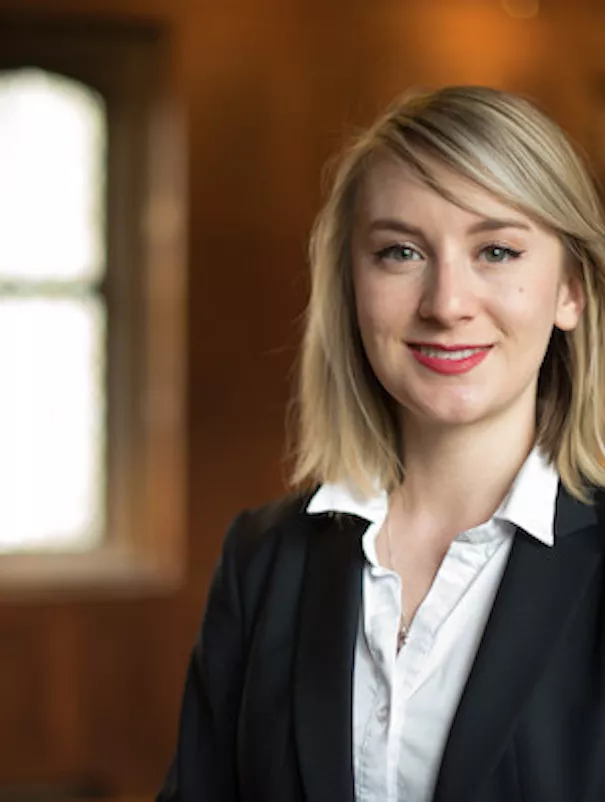As a Student Teacher, Rebekah Gallop '18 Switches Roles and Finds Herself in Front of the Classroom

After seven semesters in college classrooms, Growth and Structure of Cities major Rebekah Gallop ’18 is spending her final term at Bryn Mawr in a completely different setting. As a full-time student teacher, she spends each weekday in a high school classroom taking on all the responsibilities of a social studies teacher.
Rebekah is student teaching at the Science Leadership Academy at Beeber, a partnership school between the Philadelphia school district and the Franklin Institute, located in the city’s Overbrook section. She teaches two sections of 11th-grade U.S. history, and one section of 12th-grade constitutional law.
“It’s a lot at once. I’m learning so much," says Rebekah. "I’m constructing my own curriculum, so I go to class every day, I make my own lesson plans, and I’m also grading, checking in on students and their mental health, getting to know them as people, going to profession development meetings as well. It really is immersive.”
At Bryn Mawr, undergraduate students can pursue a minor in educational studies or a minor in teacher preparation in the Bryn Mawr/Haverford Education Program, now in its 24th year. Students like Rebekah earn a secondary teaching credential while majoring in a related field. Students meet state standards to teach in their subject area and complete the teacher certification education minor.
“Here in the Education Program we are looking at the development of pedagogical knowledge, of how do you teach, what does it look like, what does it mean to teach?" says program coordinator, advisor, and lecturer Kelly Zuckerman. "How do you develop coherent and culturally responsive pedagogy?”
The study of education in the Bi-College Consortium focuses on the interrelationships of knowledge, language, culture, and power across human development; the politics of schooling in various contexts; and the development of skills to facilitate learning and change. By connecting academic, experiential, and community-based learning, education students and faculty pursue participatory, reflective methods of research and practice. Students go on from their education studies to graduate study and work in roles that challenge and change systems to promote access, equity, and new understanding.
As students complete 12 weeks of intensive student teaching, they are enrolled in the Practice Teaching Seminar. Led by Professor Heather Curl, the seminar is designed to support, guide, and prepare students through the student teaching journey.
“It’s really friendly and calm," says Rebekah. "We do reading for each week, write weekly reflections, and then at the end we have to do an inquiry project.” The project focuses on teachers being inquirers, with the classroom as a place of knowledge creation for teachers as well as students. Thinking about teaching as a research process, Rebekah will consider how she takes what she sees in the classroom to shape the lesson plans and curricula she crafts.
“Bryn Mawr prepped me in the sense of having a framework to build my practice on,” says Rebekah. “The framework of social justice pedagogy is really strong here. I’ve been able to use all the things I learned from my thesis right away in my practice, because it was all about culturally relevant and sustaining pedagogy. And that’s something that Bryn Mawr taught me.”
Students interested in minoring in teacher certification or educational studies should contact Kelly Zuckerman at kzuckerman@brynmawr.edu.